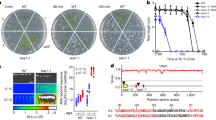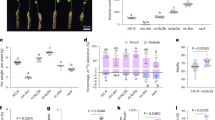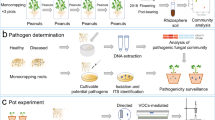Abstract
A PREVIOUS autoradiographic study1 suggested that carbohydrate was not translocated from small unproductive tillers to the main shoot and other spike-producing tillers in wheat. We have now shown, using a more sensitive technique for the recovery of radioactivity, that radiocarbon can be recovered in the growing points of spike-developing shoots of young plants, a small tiller of which has been dosed with 14CO2.
This is a preview of subscription content, access via your institution
Access options
Subscribe to this journal
Receive 51 print issues and online access
$199.00 per year
only $3.90 per issue
Buy this article
- Purchase on Springer Link
- Instant access to full article PDF
Prices may be subject to local taxes which are calculated during checkout
Similar content being viewed by others
References
Lupton, F. G. H., Ann. Appl. Biol, 57, 355 (1966).
Barnard, C., Austral. J. Bot., 3, 1 (1955).
Quinlan, J. D., and Sagar, G. R., Weed Res., 2, 264 (1962).
Pinthus, M. J., Euphytica, 16, 231 (1967).
Author information
Authors and Affiliations
Rights and permissions
About this article
Cite this article
LUPTON, F., PINTHUS, M. Carbohydrate Translocation from Small Tillers to Spike-producing Shoots in Wheat. Nature 221, 483–484 (1969). https://doi.org/10.1038/221483a0
Received:
Revised:
Issue Date:
DOI: https://doi.org/10.1038/221483a0
This article is cited by
-
A new selection criterion for yield in wheat
Theoretical and Applied Genetics (1987)
-
Vergleichend-anatomische Untersuchungen im Verwandtschaftskreis vonTriticum L. undAegilops L. (Gramineae)
Die Kulturpflanze (1977)
Comments
By submitting a comment you agree to abide by our Terms and Community Guidelines. If you find something abusive or that does not comply with our terms or guidelines please flag it as inappropriate.



